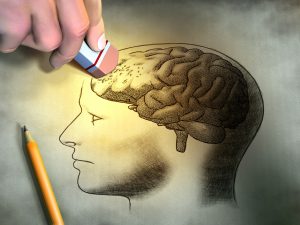Alzheimer’s is not a normal part of growing older, as many people seem to think. It is a disease that impairs memory and intellectual abilities to the point where their daily life is being affected. When people notice things in their daily life changing, there are 10 early signs to be aware of and to keep into consideration before seeking medical help.
1. Memory loss that disrupts daily life. Memory loss is one of the most common signs of Alzheimer’s, especially forgetting recently learned information. Other instances include forgetting important dates or events; asking for the same information over and over; increasingly needing to rely on memory aids (e.g., reminder notes or electronic devices) or family members for things they used to handle on their own.
2. Challenges in planning or solving problems. Some people may experience changes in their ability to develop and follow a plan or work with numbers. They may have trouble following a familiar recipe or keeping track of monthly bills. They may have difficulty concentrating and take much longer to do things than they did before.
3. Difficulty completing familiar tasks at home, at work or at leisure. People with Alzheimer’s often find it hard to complete daily tasks. Sometimes, people may have trouble driving to a familiar location, managing a budget at work or remembering the rules of a favorite game.
4. Confusion with time or place. People with Alzheimer’s can lose track of dates, seasons and the passage of time. They may have trouble understanding something if it is not happening immediately. Sometimes they may forget where they are or how they got there.
5. Trouble understanding visual images and spatial relationships. For some people, having vision problems is a sign of Alzheimer’s. They may have difficulty reading, judging distance and determining color or contrast, which may cause problems with driving.
6. New problems with words or speaking or writing. People with Alzheimer’s may have trouble following or joining a conversation. They may stop in the middle of a conversation and have no idea how to continue or they may repeat themselves. They may struggle with vocabulary, have problems finding the right word or call things by the wrong name (e.g., calling a “watch” a “hand-clock”).
7. Misplacing things and losing the ability to retrace steps. A person with Alzheimer’s disease may put things in unusual places. They may lose things and be unable to go back over their steps to find them again. Sometimes, they may accuse others of stealing. This may occur more frequently over time.
8. Decreased or poor judgment. People with Alzheimer’s may experience changes in judgment or decision-making. For example, they may use poor judgment when dealing with money, giving large amounts to telemarketers. They may pay less attention to grooming or keeping themselves clean.
9. Withdrawal from work or social activities. A person with Alzheimer’s may start to remove themselves from hobbies, social activities, work projects or sports. They may have trouble keeping up with a favorite sports team or remembering how to complete a favorite hobby. They may also avoid being social because of the changes they have experienced.
10. Changes in mood and personality. The mood and personalities of people with Alzheimer’s can change. They can become confused, suspicious, depressed, fearful or anxious. They may be easily upset at home, at work, with friends or in places where they are out of their comfort zone.
If you notice any of the 10 Warning Signs of Alzheimer’s in yourself or someone you know, do not ignore them. Schedule an appointment with your doctor to discuss the recent behaviors that you’ve been noticing. With early detection, you not only can get the maximum benefit from available treatments, but you can explore treatments that may provide some relief of symptoms and help you maintain a level of independence longer. You may also increase your chances of participating in clinical drug trials that help advance research.
(Esther Corcoran is the Program Director of the Alzheimer’s Association, CT Chapter)
____________________________
You can contact the 24-Hour Helpline at 800.272.3900 if you have any questions regarding Alzheimer’s disease, or need help with anything that you’re experiencing in regards to Alzheimer’s. When Alzheimer’s touches your life, the Alzheimer’s Association is here for you. Anytime, day or night, call us for reliable information and support. We offer evening and weekend programs, consultations, and support services. Visit the Alzheimer’s Association Connecticut Chapter at alz.org/ct for more information.
 Connecticut Estate Planning Attorneys Blog
Connecticut Estate Planning Attorneys Blog



